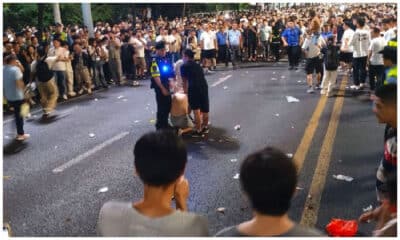China Arts & Entertainment
Weibo Night: All the Winners and the Highlights of the 2022-2023 Weibo Awards Ceremony
The main winners and trending topics surrounding the 2022/2023 Weibo Night Awards Ceremony.
Published
3 years agoon
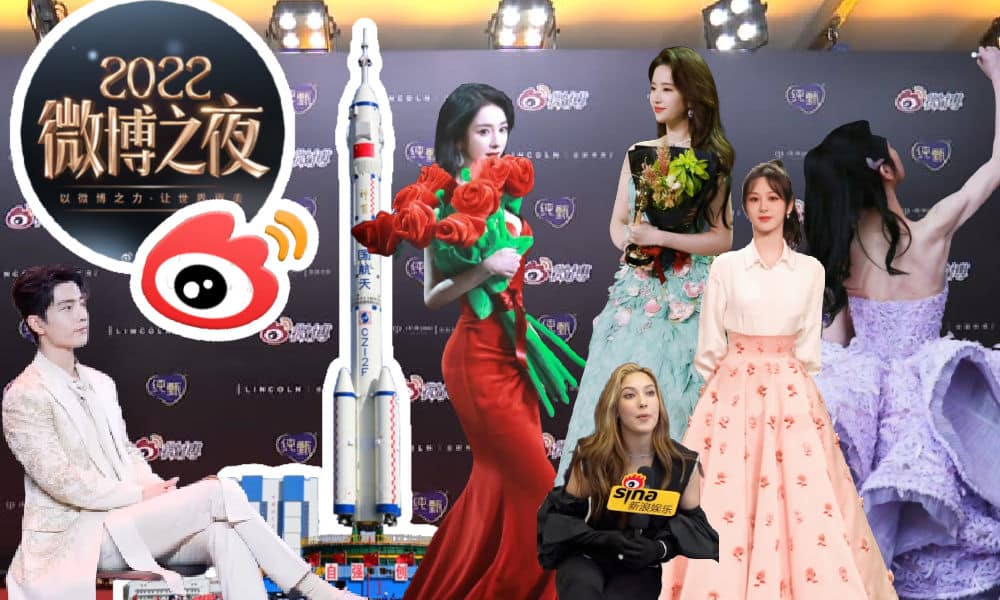
PREMIUM CONTENT ARTICLE
The biggest Weibo stars gathered at the main Sina Weibo event of the year: the annual Weibo Night. Which movies were the most popular, which influencers had their big breakthrough, and what went trending? This is an overview with a full list of all the winners and the moments that got people talking online [Premium Content].
Weibo Night was one of the biggest trends on Weibo this week. Weibo Night (#微博之夜#) is the yearly much-anticipated live-broadcasted ceremony that looks back on Sina Weibo’s hottest celebrities, entertainment productions, and happenings of the last year.
Hosted by the Sina media company, the night has been a recurring event since 2003 – long before the Sina Weibo platform was launched. The night was initially known as the ‘Sina Grand Ceremony’ (新浪网络盛典) until it turned into the ‘Weibo Night’ (微博之夜) in 2010.
During the ceremony of Weibo Night, which took place on the evening of March 25 in Shanghai and was broadcasted live on Weibo and on Sina, various prices were awarded in categories such as ‘The Hottest Weibo Celebrity of the Year’ (微博年度热度人物), ‘The Movie of the Year’ (年度电影), ‘Drama of the Year’ (年度电视剧), ‘Weibo Original Musician of the Year’, and ‘Weibo King & Queen.’
The award ceremony is always much anticipated since it is attended by all the big stars of the Chinese entertainment world, including the most famous actors/actresses, musicians, and online influencers.
What they are wearing is a big part of online discussions on Weibo Night, and with some celebrities changing their outfits during the night, talking about what they wear and who shines the brightest on the red carpet and who sits where is part of the fun.
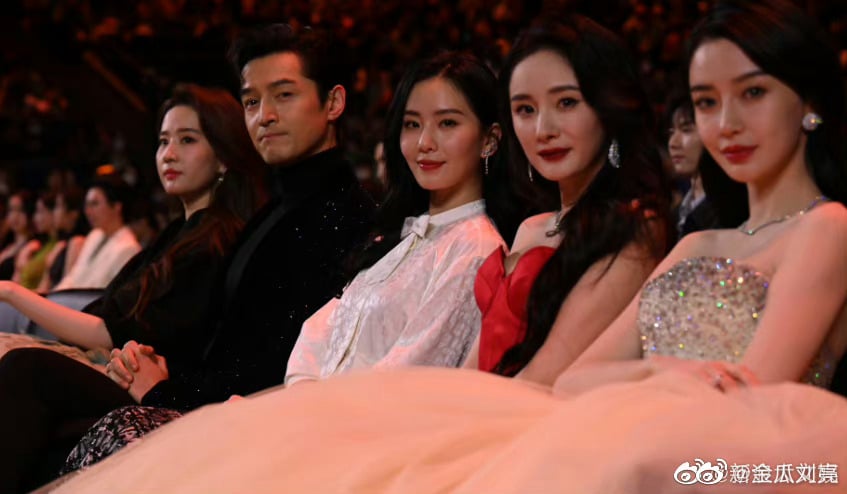
So many stars in a row! Many thought that Yang Mi, in the red dress, was one of the best-dressed celebrities of the night; others thought it was Angelababy (杨颖), who is sitting next to her. Image via Weibo.
The hype surrounding the event begins long before the actual award ceremony as Weibo users can vote for their preferred candidates, and the shortlist of winners, based on Sina Weibo’s annual “Weibo Index,” is also published prior to the event.
The event is an important one for Weibo as a platform, not just because it drives massive traffic to the site, but also because all the celebrities have a strong Weibo presence and, throughout the night, express their love for the platform.
It is also important for celebrities, as it is an opportunity for them to promote themselves and the projects they are working on. Many celebrities do special photoshoots before the event and change outfits multiple times to make the most of their participation in the event.
As you can see below, there are so many categories during the award show, and some are actually really similar. This gives the idea that more important than the awards themselves is the showcasing of Weibo’s most popular celebrities.
On Weibo, the event was promoted using the slogan “Make the world more beautiful with the power of Weibo” (“以微博之力•让世界更美”).
Although the award ceremony is taking place in 2023, they are referred to as the 2022 Weibo Night since it mostly covers the year 2022, but also part of 2023, up to Spring Festival. For an overview by What’s on Weibo on the biggest topics of 2022 see this article.
THE RED CARPET
On Weibo, the hashtag “Weibo Night Red Carpet Livestream” (#微博之夜红毯直播#) received a staggering 610 million views this week.
The live stream of the red carpet was suddenly canceled midway, as there allegedly were too many fans gathering, and cancellation was done as a safety precaution.
Some videos surfacing on social media during the day also showed many fans around the area and some food delivery staff shouting out names to bring the right order to the right customer in the midst of the crowds.
MOST IMPACTFUL EVENTS
Weibo Night started with the presenters (Nigermaidi Zechman 尼格买提·热合曼 being one of them) announce an overview of the Weibo news topics that became a part of people’s collective memory over the past year.
The video shows different topics that went trending on Weibo in 2022-2023 with news footage. The video is divided into different segments.
▶︎ Under the topic of “conflict and disaster,” they listed the following (please note that not all hashtags are literally translated, but conveying the meaning so that everyone will understand what it is about):
• Tonga Volcanic Eruption and Tsunami #汤加火山喷发# (780 million clicks on Weibo)
• Russia-Ukraine War (#俄乌局势#) (10.1 billion clicks on Weibo) (read more)
• US Federal Reserve Interest Increase (#美联储加息#)(320 million clicks on Weibo)
• Europe’s Cold Winter (#欧洲寒潮#) (110 million clicks on Weibo) (related article)
• China Eastern Airlines Flight 5735 (#MU5735#) (5.6 billion clicks on Weibo) (read more)
• Turkey-Syria Earthquake (#土耳其强震#) (510 million clicks on Weibo) (related article)
• Assassination of Japan’s former Prime Minister Shinzo Abe (#安倍普三身亡#) (2.5 billion clicks on Weibo) (more here)
▶︎ A text on the screen then emphasizes how love and kindness can shine through in times of struggle and catastrophe, and the following events are listed:
• Sichuan Luding Earthquake (#四川泸定地震#) (1.59 billion clicks on Weibo) (read here)
• Missing Man Found 17 Days after Luding Earthquake (#泸定地震中失联17天的甘字找到了#) (2 billion clicks on Weibo)
• Building a Great Wall of Fire [to Prevent Wild Fire from Spreading] (#他们用微光筑起防火长城#) (1.43 billion clicks on Weibo) (read)
• Young Courageous Heroes to the Rescue (#这些娃儿侠肝义胆#) (540 million clicks on Weibo) (more)
▶︎ Then the text on the screen says: “There will always be people who create miracles by challenging oneself.”
• Kipchoge Won Men’s Marathon World Record (#吉普乔格打破男子马拉松世界纪录#) (120 million clicks on Weibo)
• Argentina Wins World Cup (#阿根廷冠军#) (3.9 billion clicks on Weibo)
• Eileen Gu Wins Gold (#谷爱凌金牌#) (4.1 billion clicks on Weibo) (related articles)
• Su Yiming Wins Gold (#苏翊鸣金牌#) (1.7 billion clicks on Weibo)
• Xu Mengtao Wins Gold (#徐梦挑金牌#) (1 billion clicks on Weibo)
• China Wins Its First Gold of the Games (#短道速滑中国队北京冬奥会首金#) (1.37 billion clicks on Weibo)
• China Wins in Women’s Asian Cup (#中国女足亚洲杯冠军#) (2.8 billion clicks on Weibo)
▶︎ The text on the screen then says: “There will always be people who firmly believe that there will be Spring after longing for it.”
• China Cancels Circuit Breaker Measures for Inbound Flights (#入境航班熔断机制取消#) (150 million clicks on Weibo)
• End to [Covid-19] Travel Code Service (#行程卡下线#) (550 million clicks on Weibo)
• Goodbye Health Code (#告别健康吗#) (1.19 billion clicks on Weibo) (read here)
• Hello, 2023 (#你好2023#) (670 million clicks on Weibo)
▶︎ Text: “There will always be people who restart first after facing difficulties.”
• Full River Red Breaks 4.5 Billion at Box Office (#满江江实时票房破45亿#) (170 million views on Weibo)
• Wandering Earth 2 Breaks Box Office 4 Billion (流浪地球2票房破40亿) (290 million clicks on Weibo)
• Boonie Bears Guardian Code Breaks 1.4 Billion at Box Office (#熊出没之伴我熊芯票房破14亿#) (120 million clicks on Weibo)
• The Knockout (#狂飙#) (1 billion clicks on Weibo)
• A Lot of Concerts (#好多演唱会#) (110 million views)
▶︎ “There will always be people who turn a seed once planted into glory.”
• China Discovers New Moon Mineral (#月亮上发现嫦娥石#) (160 million clicks on Weibo)
• China Launches Third Aircraft Carrier (#我国第三艘航母下#) (1 billion clicks on Weibo)
• China’s C919 Jet Obtains Certificates for Commercial Flight (C919交付准备工作正有序推进) (190 million views)
• China’s Shenzhou-14 Manned Space Mission (#神十四发射成功#) (490 million clicks on Weibo)
• China Space Station Completes T-shape Basic Structure Assembly (#中国空间站“T”字基本构型在轨组装完成#) (140 million clicks on Weibo)
• Chinese Astronauts’ Firt Space Meeting (中国航天员首次太空会师) (110 million views on Weibo)
• China’s Shenzhou 14 Returns on Earth (#神十四返回地球#) (490 million clicks on Weibo)
Highlighted events: Tribute to China’s Firefighting Heroes
After the overview of all of these big topics, Chinese spaceflight Shenzhou 14 was highlighted and honored as one of the most important Weibo events of the year, together with the Chongqing wild fires.
Yang Zi, dressed in a black dress, was the actress to deliver a speech to pay tribute to the heroes of the Chongqing wildfires.
MOST INFLUENTIAL IN MUSIC
Weibo Breakthrough Artist of the Year
Voted as musicians that made the biggest breakthrough were:
• Liu Yuxin (刘雨昕), Guizhou-born singer/dancer
• Ouyang Nana (歐陽娜娜), Taiwanese singer, musician, and actress
• Shan Yicun (单依纯), Chinese singer and former winner of The Voice of China
▶︎ In this same category, the group INTO1 received the award for the most notable breakthrough pop group of the year. The group received attention on social media for their extremely correct posture during the award ceremony.
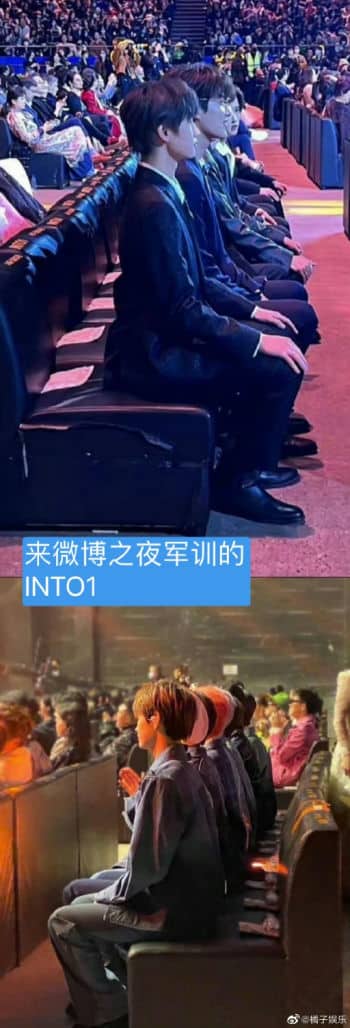
INTO1 was like its own little army during Weibo Night (image via Weibo).
Best Newcomer and Rising Stars
In the category of rising star awards – or those having made the biggest “leap” (微博年度飞跃音乐人), – are:
• Ayunga (阿云嘎), Mongolian musical theater actor, singer, and songwriter
• Gina Alice Redlinger (吉娜爱丽丝), German-Korean pianist who happens to be married to the renowned Chinese pianist Lang Lang
• Dany Lee (李斯丹妮), Chengdu-born singer
▶︎ Boy band BOYSTORY was among the first to receive an award during Weibo Night, namely that of the best newcomer pop group (微博年度新锐团体).
Weibo’s Original and Influential Musician of the Year
• Wang Yuan (王源)
▶︎ Wang Yuan (王源, also known as Roy Wang) won the award for Original Musician of the Year. Born in 2000, Wang is mostly known as a member of the hugely popular TFboys idol group that debuted in 2013, but his solo career has also been thriving for years.
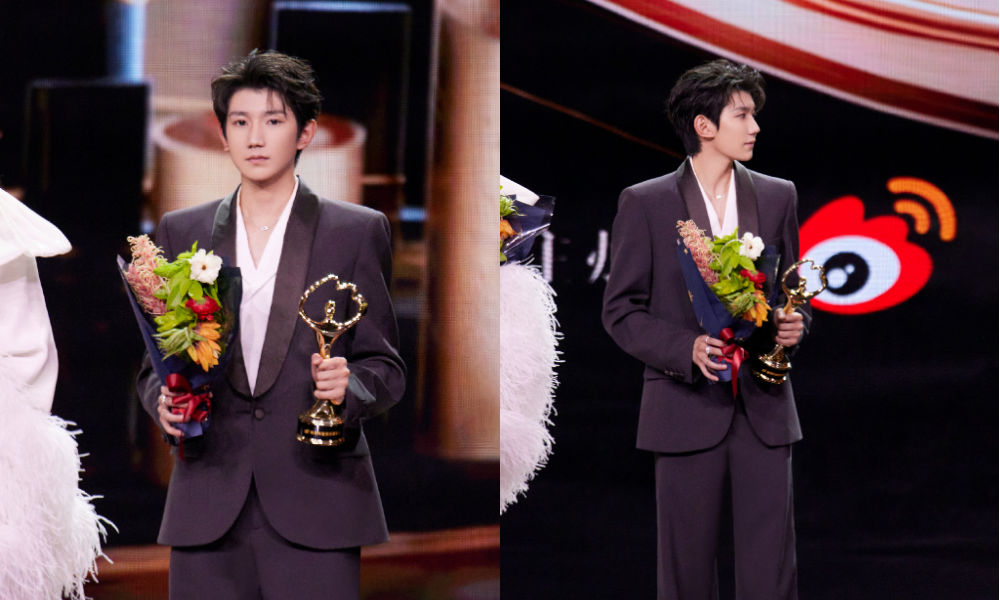
Roy Wang accepts his award at the Weibo Night, images by Sina Weibo.
• Li Yuchun (李宇春)
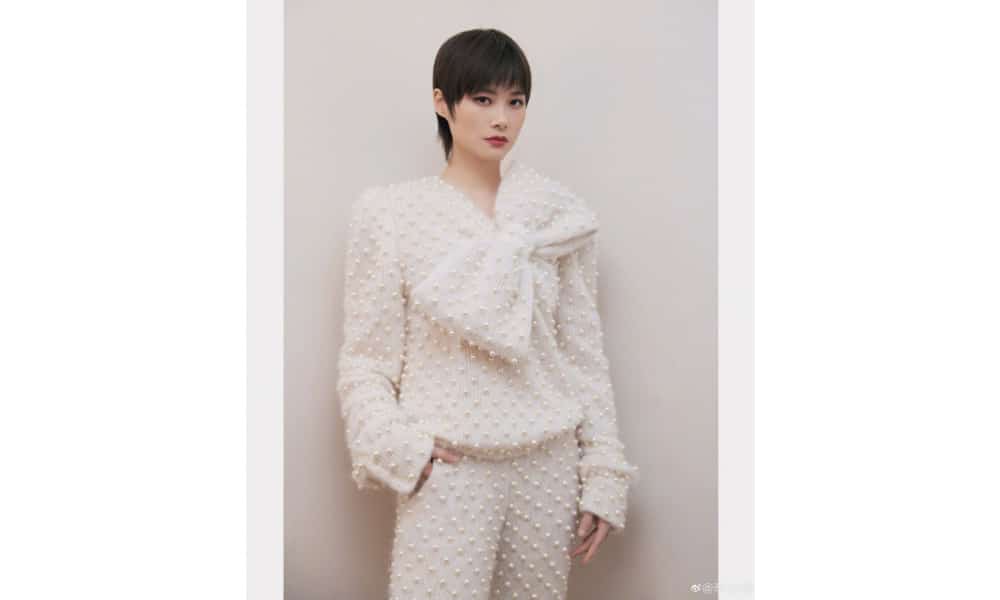
Li Yuchun shared a photo of her outfit on her own Weibo account.
▶︎ Li Yuchun (李宇春), once known as China’s “most handsome supergirl,” received the award for Weibo Influential Musician of the Year. Since winning the nationwide talent show ‘Supergirl’ (Chaoji Nüsheng) and appearing on the cover of Time Magazine Asia in 2005, Li Yuchun has become a household name in China and managed to stay popular. During Weibo night, she wore a beautiful white suit and was one of the few ladies not wearing a long dress for the occasion (Eileen Gu also wore pants!). Li Yuchun also performed at the event later on in the show.
Weibo Outstanding Musician of the Year
In the “Outstanding Singers” category, the awards went to the popular female singers:
• Yu Wenwen (于文文)
• Yuan Yawei (袁娅维)
• Zheng Suyan (郑秀妍)
Weibo Music of the Year
The award for Weibo Music of the Year (微博年度人气音乐) went to the following songs:
• “Just Like Sunshine” (像阳光那样) – Wang Yibo (王一博)
• “To Find You” (寻一个你) – Liu Yuning (刘宇宁)
• “Worry-Free” (花开忘忧) – Zhou Shen (周深)
MOST INFLUENTIAL IN ACTING
Weibo Breakthrough Actor of the Year
• Wang Yibo (王一博)
▶︎ Wang Yibo (王一博) is the winner of the Weibo Breakthrough Film Star of the Year. Wang (1997) has been super popular in China for years. Born in Henan, he is a multi-talent and is active as an actor, singer, dancer, rapper, and professional road motorcycle racer. In 2014, Wang debuted as a member of the South Korean-Chinese boyband UNIQ. Since then, his career has been thriving and he has starred in various popular productions, such as 2019 drama The Untamed (陈情令).
The Weibo Breakthrough Actor of the Year Award (微博年度突破演员), given to those actors who made a significant breakthrough in their careers during the past year, went to:
• Han Dongjun (韩东君)
• Jin Chen (金晨)
• Li Yitong (李一桐)
• Liu Yuning (刘宇宁)
• Xu Kai (许凯)
• Zhang Jingyi (张婧仪)
Newcomers, Rising, and Eye-Catching Actors of the Year
The award for best newcomer went to young actors:
• Hu Lianxin’er (胡连新儿)
• Wang Churan (王楚然)
• Wang Jiayi (王家义)
• Wu Xuanyi (吴宣仪)
• Zhang Yifan (张艺凡)
• Zhou Yiran (周艺然)
The Rising Actors Award (微博年度飞跃演员) went to:
• Bai Lu (白鹿)
• Guan Xiaotong (关晓彤)
• Mao Xiaotong (毛晓彤)
• Song Yi (宋轶)
• Tang Jianji (檀健次).
The ‘Eye-Catching Actors’ award (微博年度瞩目演员), which is about those actors who have achieved significant popularity and influence on social media, went to:
• Wang Jun (王俊)
• Wang Hedi (王鹤棣)
• Wu Lei (吴磊)
• Yu Shuxin (虞书欣).
The Weibo award for most promising or hard-working actors (微博年度进取演员) went to:
• Chen Zheyuan (陈哲远)
• Hou Minghao (侯明昊)
• Li Landi (李兰迪)
• Shen Yue (沈月)
• Tian Xiwei (田曦薇)
• Wang Ziyi (王子异)
• Zhang Linghe (张凌赫)
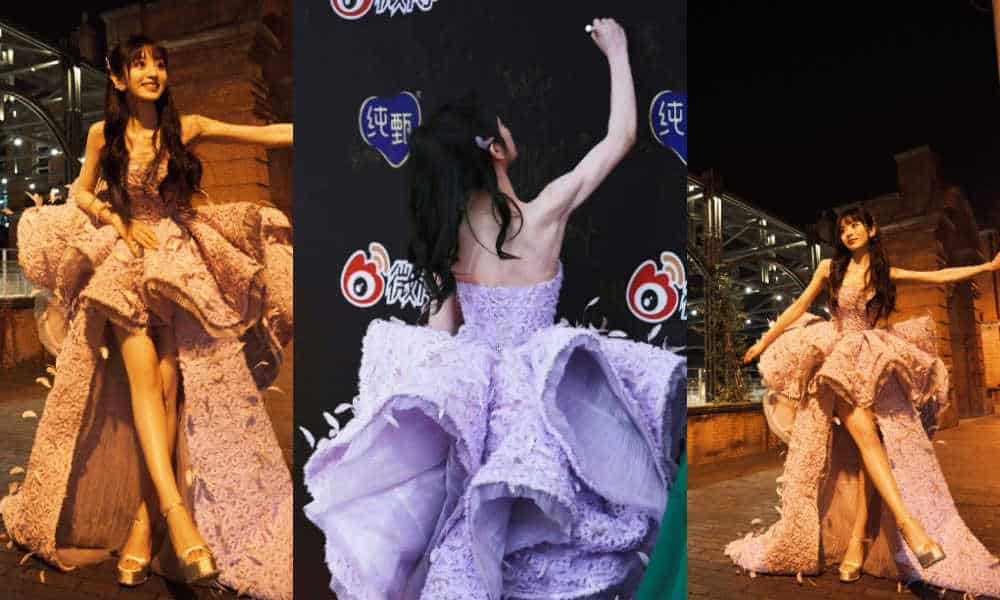
Tian Xi wei in Sophie Couture for Weibo Night, photos via Sina Weibo.
▶︎ Chinese actress Tian Xiwei stood out with a beautifully designed pink dress by Sophie Couture.
Weibo Attractive Actors of the Year
Honored as the most “attractive” actors of the year are:
• Gao Ye (高野)
• Pan Yueming (潘粤明)
• Tong Yao (童瑶)
• Wang Yang (王洋)
Weibo Night Performers of the Year
The Weibo award for performance of the year (微博年度表现力演员) went to:
• Dilraba Dilmurat (迪丽热巴), Chinese actress who recently starred in the popular series You Are My Glory (这个杀手不太冷静)
• Li Xian (李现), Chinese actor who starred in TV series Meet Yourself (which actually boosted Yunnan tourism)
• Yang Zi (杨紫), one of the big stars of the night who starred in multiple successful productions recently
Weibo Public Favorite Actors of the Year
The Weibo Public Favorites Actors of the Year awards, also called the Weibo Word-of-Mouth Actors of the Year (微博年度口碑演员) award, went to:
• Ma Li (马丽)
• Song Jia (宋佳)
• Yao Chen (姚晨)
▶︎ Of course, Yao Chen should be on this list – although Yao Chen is not necessarily China’s number one actress, she was one of the first celebrities to share her personal life on Weibo since 2009,and interact with her fans. On Weibo, she talks about her everyday life, family, news-related issues, work, and fashion. She posts a lot personal pictures every day. Yao Chen’s popularity as an actress and philanthropist combined with her frequent Weibo updates and closeness to her fans have made her a huge Weibo celebrity.
▶︎ Ma Li (马丽) has been in the limelight a lot reently. The Chinese actress starred in Too Cool to Kill (这个杀手不太冷静) and was a hit star during the Spring Festival Gala.
Weibo Quality Actor of the Year
They received the Quality Actor of the Year (微博年度品质演员) Award at the Weibo Award stage:
• Xiao Zhan (肖战)
• Liu Yifei (刘亦菲, Crystal Liu)
• Zhang Ruoyun (张若昀)
▶︎ Zhang is known for his acting work in various productions and well-known dramas, such as Joy for Life (2019). In 2022, he starred in Under The Microscope, a series about a math genius who ends up in a complex web of corruption and lies after he discovers a major tax discrepancy in his county’s finances.
Weibo Awards for Fine Acting of the Year
The award for realistic acting / fine acting (微博年度质感演员) went to some of China’s most renowned actresses, namely:
• Yang Mi (杨幂), the super popular actress who recently starred in Thank You Doctor (谢谢你医生)
• Angelababy (杨颖), the multitalented celebrity who often makes it to Weibo’s top trends
• Tong Liya (佟丽娅), actress and dancer of Xibo ethnicity who won many awards for her acting work
• Liu Shishi (刘诗诗), the renowned actress who is commonly praised for her quality acting
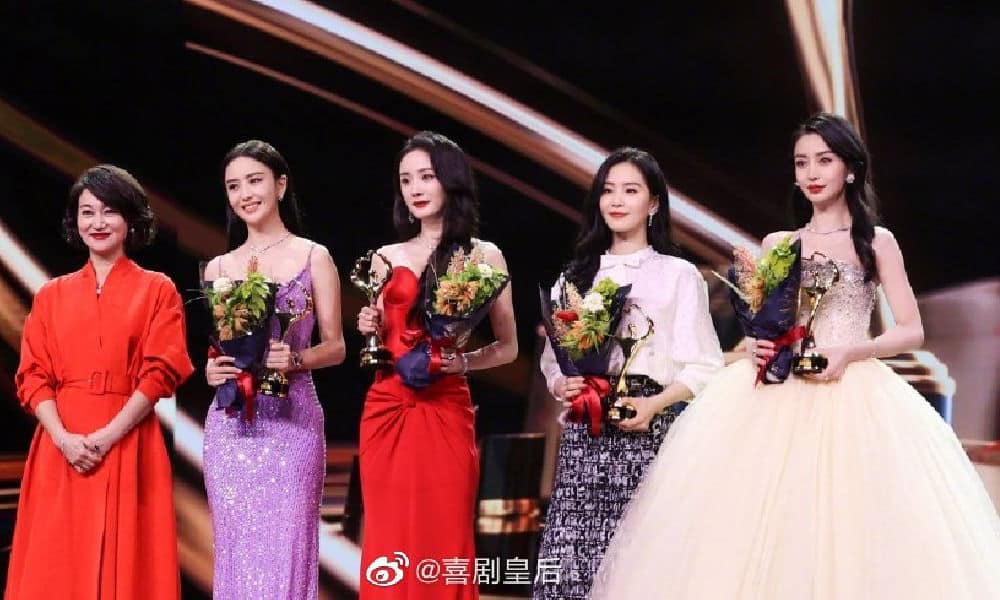
The actresses take their award at the Weibo Night stage.
▶︎ This became a much talked about moment since it was the first time for Angelababy to be at an event with Chinese actor Huang Xiaoming. The moment Angelababy went on stage, the camera focused on Huang who spoke a few words with Li Bingbing who sat right next to him. This sparked discussions on what he said at that moment, and simlarly, when Huang was on stage, people wanted to know what Angelababy was saying to Yang Mi. Oh, if only you could be a fly on the wall!

Weibo Award for Influential Actor
The award for actor that had the most influence / impact on Chinese social media thi year (微博年度影响力演员) went to:
• Li Bingbing (李冰冰)
▶︎ Li Bingbing shared the stage with Li Yuchun for this award, as Li Yuchun was honored for being the most influential musician.
MOST INFLUENTIAL IN MOVIES
Weibo Breakthrough in Film
The awards for the most notable breakthrough in film (微博年度突破电影人) went to:
• Wang Yibo (王一博)
• Da Peng (大鹏)
• Zhang Chiyu (张吃鱼/张迟昱)
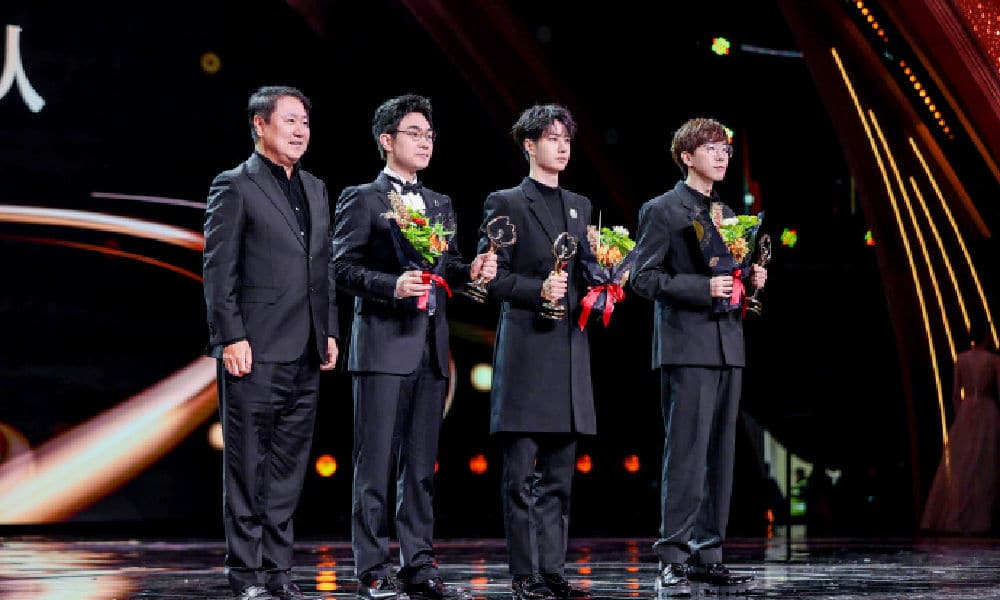
The breakthrough in film winners, photo shared by Da Peng on Weibo.
▶︎ Da Peng, who is always quite active on Weibo (@大鹏董成鹏), is the director and screenwriter for the Chinese comedy movie Post Truth (保你平安) about a former mob boss who has now ventured in the business of selling burial plots and finds himself in the middle of a rumor scandal after the death of one of his clients.
Weibo Quality and Impactful Films of the Year
Honored in the category of “quality film” of the year (微博年度品质电影):
• Moon Man (独行月球)
• Song of Spring (妈妈)
• Lighting Up the Stars (人生大事)
• Hidden Blade (无名)
Honored in the category of films that made the most impact on Weibo (微博年度影响力电影), meaning they generated the most online discussions and often topped the Weibo trending lists:
• Wandering Earth 2 (流浪地球2)
• Full River Red (满江红)
• Home Coming (万里归途)
Weibo Quality Filmmakers of the Year
The award for quality film influentials of the year (微博年度品质电影人) went to:
• Lei Jiayin (雷佳音)
• Jackson Yee (易烊千玺)
• Rao Xiaozhi (饶晓志)
• Wen Muye (文牧野)
▶︎ Wen Muye directed the 2022 movie Nice View (奇迹·笨小孩) which stars Jackson Yee and tells the story of the 20-year-old Jing Hao who comes to live in Shenzhen to look after his little sister Tong Tong after the unexpected death of their mother. Rao Xiaozhi directed Home Coming, one of the major box office hits of 2022.
Best Movies of the Year
The most beloved movies of the year on Weibo (微博年度人气电影) are:
• Hidden Blade (无名)
• Wandering Earth 2 (流浪地球2)
• Home Coming (万里归途)
▶︎ Hidden Blade is a 2023 Chinese World War II espionage thriller directed by Cheng Er. ‘Home Coming’ (万里归途) is inspired by China’s overseas citizens protection response during the 2011 Libya crisis, and it sparked waves of nationalistic sentiments earlier in 2022.
▶︎ The sci-film Wandering Earth 2 became a box office hit in 2023 and has already become a part of China’s online culture in terms of visuals, memes, and vocabulary.
Weibo Most-Watched Movie Person of the Year
The award for Weibo Most-Watched Movie Personality (微博年度关注电影人) went to:
• Karry Wang (王俊凯)
• Li Yu (李玉)
• Yang Lina (杨荔钠)
▶︎ Yang Lina wrote and directed the 2022 film Song of Spring (妈妈), which tells the moving story of an 85-year-old mother caring for a 65-year-old daughter with Alzheimer’s disease.
Weibo Most Influential Director of the Year
▶︎ Zhang Yimou (张艺谋) received the award for most influential director of the year. The renowned director’s latest film Full River Red (满江红), a historical suspense comedy film starring Shen Teng and Jackson Yee, became a hit during the Spring Festival holiday and is China’s sixth highest-grossing box office entry of all time.
MOST INFLUENTIAL IN TV
Weibo Drama of the Year
This honors the Weibo serialized dramas of the year (微博年度剧集):
• Love Between Fairy and Devil (苍兰诀)
• Draw The Line (底线)
• Wild Bloom (风吹半夏)
• The Knockout (狂飙)
• The Three-Body Problem (三体)
• Bright Future (县委大院)
• Love Like the Galaxy (星汉灿烂·月升沧海)
• The Story Of Xing Fu (幸福到万家)
• The Blue Whisper (驭鲛记之与君初相识·恰似故人归)
Weibo Drama of the Year
• The Oath of Love (余生,请多指教) – Yang Zi and Xiao Zhan both star in this drama about a romance between a doctor and pianist
• Being A Hero (冰雨火) – crime and mystery drama featuring Chen Xiao and Wang Yibo
• Immortal Samsara (沉香如屑·沉香重华) – xianxia drama starring Yang Zi and Cheng Yi
Variety Show of the Year
• Street Dance of China 5 (这就是街舞5) – reality competition show focused on street dance
• Time Concert: Season 2 (时光音乐会2) – music variety show
• Hello, Saturday! (你好星期六) – variety show including games, interviews, and more
MOST INFLUENTIAL WEIBO CELEBRITIES
Weibo Influential Sports Personality of the Year
The award for Weibo’s Annual Most Influential Sport Person (微博年度影响力体育人物) went to:
• Eileen Gu (Gu Ailing)
• Ren Ziwei (任子威)
▶︎ 2022 really was the big year of Eileen Gu (@青蛙公主爱凌, 6.5 million fans), the America-born Olympic freestyle skier and gold medalist who came out for China. Although Gu could not attend the Spring Festival Gala earlier this year, she did attend Weibo Night, wher she changed outfits twice and also gave some interviews. For more about the Year of Eileen Gu, see our article here.
Hottest Celebrities of the Year
• Xiao Zhan (肖战)
• Yang Zi (杨紫)
• Wang Yibo (王一博)
▶︎ Xiao Zhan, Yang Zi, and Wang Yibo were the big winners of the Weibo Night. They all received the awards as the most popular Weibo celebrities. Xiao Zhan has over 31 million followers on Weibo (@X玖少年团肖战DAYTOY); Yang Zi has over 60 million (@杨紫); Wang Yibo (@UNIQ-王一博) has over 40 million.
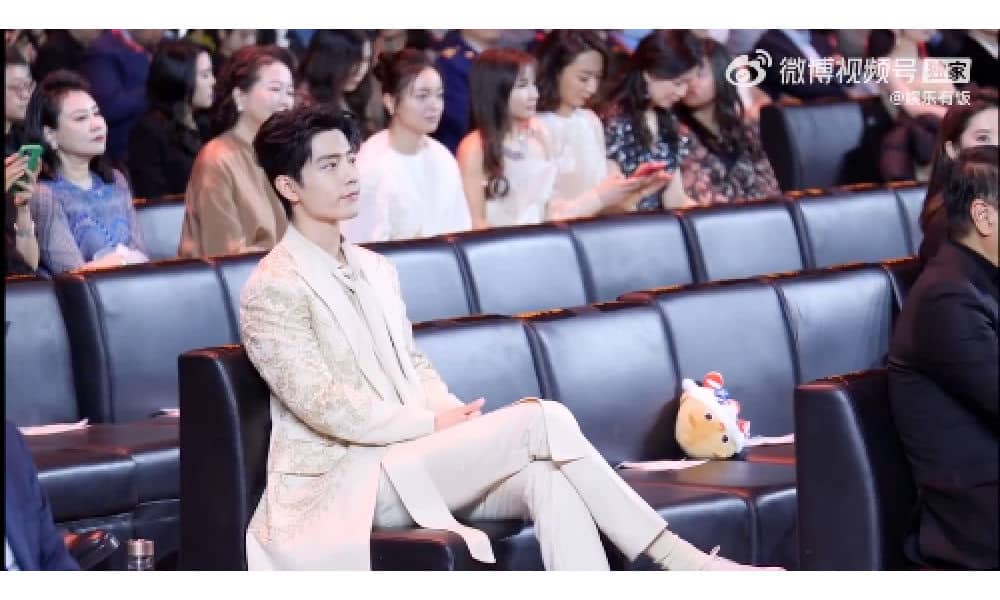
A moment of Xiao Zhan sitting by himself, with his back super straight and a serious face, also went viral on Chinese social media.
▶︎ Besides both being super popular on Weibo, Xiao Zhan and Wang Yibo have more in common: they both starred together in the 2019 Chinese television series The Untamed, which is also very popular within online boys’ love communities.
The popular actress and singer Yang Zi, also known as Andy Yang, is also known for starring in various hit dramas such as Ode to Joy, Ashes of Love, Go Go Squid!, and Oath to Love.
Weibo Annual Favorite Person
The Weibo celebrities with the most likability are:
• Chinese table tennis player Sun Yingsha (孙颖莎)
• Professional esports multigame player Yi Nuo (一诺)
• South-Korean-born Chinese short track speed skater Lin Xiaosha (林孝埈)
The Queen and King of Weibo
• Hu Ge (胡歌)
• Liu Yifei (刘亦菲, Crystal Liu)
▶︎ The most anticipated awards of Weibo Night are those of the Weibo Queen and King. This year, Hu Ge (胡歌) was voted Weibo King while Liu Yifei (刘亦菲, Crystal Liu) accepted the Weibo Queen award. Liu Yifei is a Chinese-American actress who is most famous outside of China for starring in Disney’s Mulan live-action movie. Liu Yifei, who was recently announced as the new global spokesperson for Bvlgari, wore a spectacular Elie Saab dress to the Weibo night awards.
▶︎ Liu was reunited on stage with Weibo King Hu Ge, with whom she starred in the popular Chinese TV drama series Chinese Paladin. Hu Ge has previously won numerous awards for his acting, including the Best Actor Award at the 2013 Golden Eagle Awards and the Best Actor Award at the 2016 China Britain Film Festival. He is also popular as is a singer in China.
By Manya Koetse
This is original What’s on Weibo content for you as a premium member, please do not reproduce without permission.
Get the story behind the hashtag. Subscribe to What’s on Weibo here to receive our newsletter and get access to our latest articles:
Spotted a mistake or want to add something? Please let us know in comments below or email us. First-time commenters, please be patient – we will have to manually approve your comment before it appears.
©2023 Whatsonweibo. All rights reserved. Do not reproduce our content without permission – you can contact us at info@whatsonweibo.com.
Manya is the founder and editor-in-chief of What's on Weibo, offering independent analysis of social trends, online media, and digital culture in China for over a decade. Subscribe to gain access to content, including the Weibo Watch newsletter, which provides deeper insights into the China trends that matter. More about Manya at manyakoetse.com or follow on X.

You may like
China Arts & Entertainment
The Wong Kar-wai Scandal Explained: The Dark Side of ‘Blossoms Shanghai’
Whenever reports surfaced about the harsh conditions on Wong Kar-wai’s sets, mainstream media and fans often brushed off his tyrannical habits as the quirks of a genius. This time, it feels different.
Published
1 week agoon
October 3, 2025By
Ruixin Zhang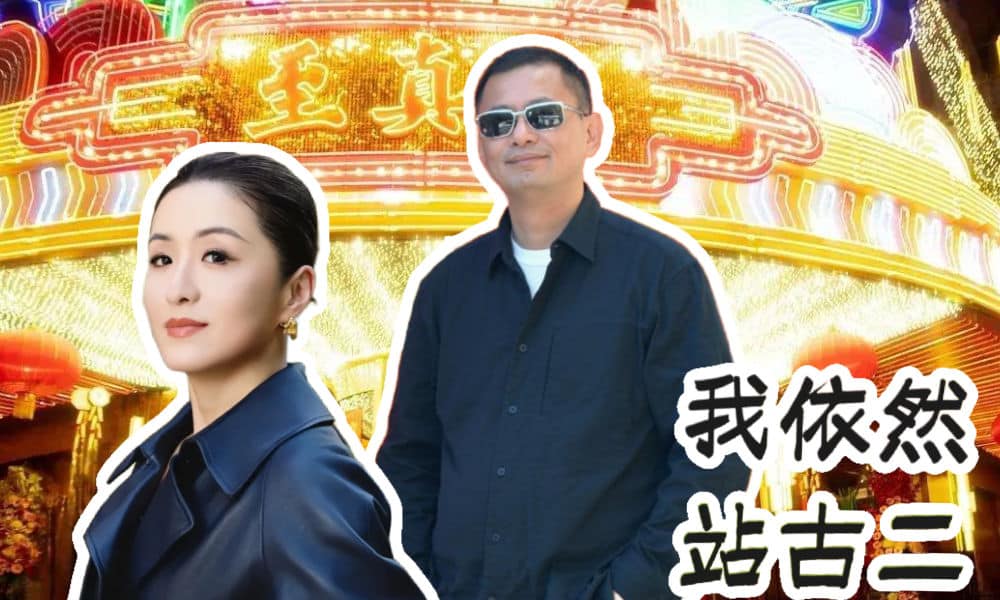
After renowned director Wong Kar-wai was accused of exploiting a young writer during the production of the hit TV drama Blossoms Shanghai, a scandal unfolded that may be one of the biggest stories in China’s entertainment industry this year.
Even if you don’t recognize him by face, you most likely know him by name: Wong Kar-wai (王家卫, 1958), the internationally acclaimed Hong Kong movie director.
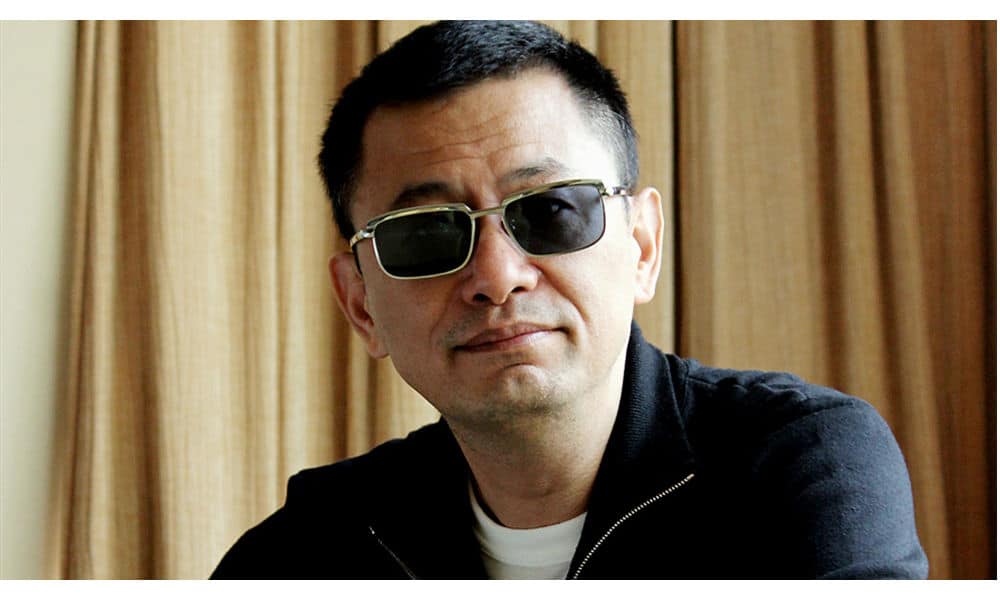
Director Wong Kar-wai, characteristically in sunglasses. (Image via Iazimao).
In late 2023, Wong Kar-wai released his first television series, Blossoms Shanghai (繁花), which was referred to a being the third part of an informal Wong Kar-wai trilogy that started with his films In the Mood for Love and 2046. Thanks to its superior production quality, star-studded cast, and Wong Kar-wai’s signature visual style, it became one of the most talked-about Chinese TV dramas of the time.

Scenes from Shanghai Blossom.
Adapted from Jin Yucheng’s award-winning novel, Blossoms Shanghai is set in 1990s Shanghai and tells the story of a young man, A Bao (played by Hu Ge 胡歌), who aspires to become a successful businessman and self-made millionaire during China’s booming reform era. The series contrasts the protagonist’s troubled past with the city’s vibrant present—and even sparked a wave of visitors to Shanghai landmarks featured in the show.
“Overnight, the headline “Wong Kar-wai Suspected of Exploiting Employees” became the biggest story in Chinese entertainment news”
However, in September, screenwriter Gu Er (古二,real name Cheng Junnian 程骏年) stirred controversy when he published a post on his WeChat official account, @GuErNewWords (古二新语), accusing Wong Kar-wai and lead writer Qin Wen (秦雯) of serious exploitation during the production of Blossoms Shanghai.
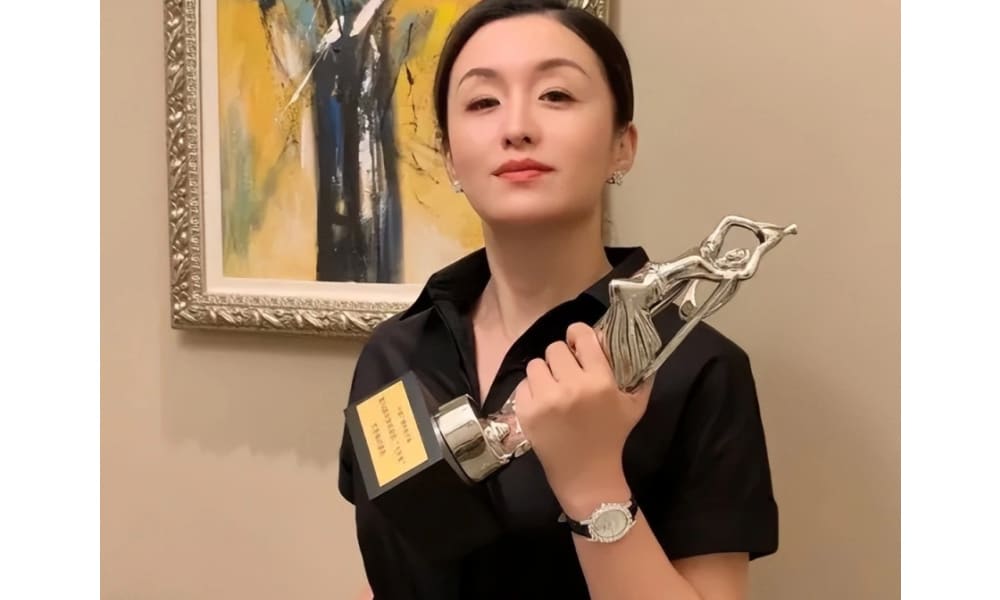
Qin Wen, image via Tencent News.
Overnight, the headline “Wong Kar-wai Suspected of Exploiting Employees” (王家卫《繁花》被爆疑似压榨员工) became the biggest story in Chinese entertainment news.
Gu Er is an experienced young screenwriter. After earning a master’s degree from the New York Film Academy, he returned to China, where he worked in theater and dabbled in online films. Though he never became a household name, he had carved out a modest presence in the entertainment industry.
According to a series of diaries he began sharing on WeChat in 2022, Gu Er first joined the Blossoms production team in 2019.

Example of Gu Er’s writings, where he talked about the difficult conditions of working on the Blossoms production.
He described the experience as “powered purely by love” (用爱发电)—in other words, long hours, meager pay, and sheer passion keeping him afloat. These early posts detailed many interactions with Wong Kar-wai and lead scriptwriter Qin Wen, but since the drama had not yet aired, his satirical, lightly veiled critiques attracted little attention.
“When the credits rolled, Gu Er’s name was nowhere to be found under the screenwriting slot”
In 2023, upon the premiere of the series, Gu Er published an article titled “The Truth Behind the Writing of Blossoms” (《繁花》剧本的创作真相). In it, he claimed to have written substantial portions of the storyline and character arcs—work that, he said, had been personally approved by Wong.
He also shared chat screenshots and presented several key concepts he had pitched, many of which viewers later recognized in the broadcast series.
Yet when the credits rolled, his name was nowhere to be found under the screenwriting slot. Instead, he was listed only as “preliminary editor” (前期责编), buried at the very end of the credits in a position so minor it was almost negligible.
For Gu Er, this was humiliating. He believed that his field research, character development, and story-building should have earned him recognition as at least one of the principal writers. The post sparked some discussion, but once again, the controversy quickly faded.

Cheng Junnian is Gu Er’s real name, and in the later recordings he posted, Wong Kar-wai also called him by his real name.
It wasn’t until September 16, 2025—nearly two years later—that Gu Er released another definitive essay, “My Experience as a Screenwriter for Blossoms: A Summary” (《我给〈繁花〉做编剧的经历——小结》).
This time, he laid bare every painstaking detail of his creative process for the main female character’s storyline. He claimed that the production refused to reimburse any of his research and interview expenses—not even for meals or books. He recalled one particular moment: “Once I spent 100 yuan [$7], and the Hong Kong producer immediately scolded me in public: ‘How does writing cost any money?’”
“It’s just a few thousand yuan; he is an assistant and can also write the script—it’s a bargain”
Besides writing duties, Gu Er said he also had to cook meals and run endless errands for Wong Kar-wai. In fact, Gu Er suffers from Kennedy’s disease, a motor neuron illness similar to ALS but slower in progression. Like ALS patients, he is gradually losing strength in his limbs. The intense, high-pressure work environment on set made his condition much worse. When he first told Wong Kar-wai about his health, Wong allegedly responded with nothing but suspicion: “What do you want from me?”

Gu Er, image from the time he was a guest chef at Dee Hsu’s reality show.
Wong Kar-wai wasn’t the only person Gu Er accused of exploitation. He also named lead screenwriter Qin Wen, one of the most prominent figures in Chinese television, known for hit dramas such as The First Half of My Life (我的前半生) and My Heroic Husband (赘婿). Qin is also credited as the screenwriter of Blossoms. According to Gu Er, once his draft script was handed to Qin Wen, she “made a few revisions,” and it was then presented as her work.
He further alleged that Qin tried to push him out of the production team, but Wong Kar-wai intervened, saying: “It’s just a few thousand yuan; he is an assistant and can also write the script—it’s a bargain.”
This post finally drew widespread attention. While the public was shocked by the alleged misconduct of a beloved director, many also questioned Gu Er’s credibility.
The Blossoms production team quickly issued a statement, asserting that more than 2,000 crew members had all been properly credited, and later clarified that Gu Er had only been part of the early-stage research team.
“The very type of boss you’d be too afraid to confront in your own workplace”
However, netizens began combing through Gu Er’s WeChat account and discovered that, in recent months, he had uploaded a series of audio recordings of conversations among the production staff—including Wong and Qin.
These recordings became crucial evidence in Gu Er’s defense. In one recording, a producer admitted that Qin had used ghostwriters and that several major plotlines had, in fact, been written by Gu Er. She also acknowledged that it would be difficult for him to receive proper credit.
Other tapes revealed the director’s harsh treatment of crew members; in one instance, Gu Er himself was publicly humiliated and accused of being “a dog using its master’s power” (狗仗人势).
On September 22, Gu Er released another recording. This time, it featured Wong Kar-wai and Qin Wen gossiping about several well-known actors; when the conversation ended, they asked Gu Er to serve them their food.
Having studied at Le Cordon Bleu in San Francisco, Gu Er had apparently been cooking for Wong without pay. Netizens were particularly angered by how arrogant and condescending Wong sounded in the recording, which many said reminded them of the very type of boss they had been too afraid to confront in their own workplaces.
At the same time, netizens dug up a 2024 report from Hong Kong’s Ming Pao (明报), which detailed how a female screenwriter’s script for Blossoms had also allegedly been exploited by Wong Kar-wai. That writer, too, reportedly suffered from depression as a result.
“The Gu Er incident is a snapshot of class solidification”
On September 23, Gu Er’s WeChat account was taken down, rendering all of his articles and audio recordings inaccessible.
Since both WeChat and the parent company of Blossoms’ production house, Tencent Pictures, are owned by Tencent, netizens immediately speculated that the platform had silenced Gu Er to contain the scandal. The move only fueled public suspicion that Wong had indeed exploited young writers—and calls grew louder for an official response from Wong Kar-wai.
As the controversy spread, screenwriter Qin Wen posted a denial on Weibo, insisting that she had been slandered.
Oscar-winning cinematographer Peter Pau (鲍德熹), who worked on Blossoms, also weighed in, saying that all responsibilities had been clearly outlined in the contracts and accusing Gu Er of deliberately stirring trouble. Hong Kong director Wong Jing (王晶) likewise voiced his support for Wong Kar-wai.
However, the broader public—the majority of netizens as well as many within the industry—stood by Gu Er.
The film news account Qiangbaoshan (@誓要抢包山) commented that regardless of the exact truth of Gu Er’s claims, it was already alarming and unjust that major figures in the film industry had banded together to discredit him while his own platform was banned.
Commenters on Xiaohongshu wrote thousands of posts in defense of Gu Er, calling the incident “a snapshot of class solidification,” or writing: “I also stand with Gu Er. Either you hire a proper chef, or you clearly define the work. If someone contributes ideas and creativity, then give them the pay and credit they deserve.”
Gu Er’s friend Ma Nong (玛侬) also published an article on her WeChat official account in his defense, sharing new photos of Gu Er at work and on set to prove that he had indeed played an important role in the Blossoms production.
Yet through it all, to this day, Wong Kar-wai himself has not uttered a single word in response.
“Because of his cinematic achievements, the media and fans often laughed off his tyrannical behavior as the eccentric quirks of a genius”
Some netizens, after learning the details, were puzzled by Gu Er’s behavior. They criticized him as weak and overly servile, suggesting that what he faced now was partly the result of his own personality flaws.
Yet this very dynamic may be why the public’s anger toward Wong Kar-wai ran so deep. Wong is arguably one of the most influential directors in Chinese cinema. Works such as In the Mood for Love, Chungking Express, and Happy Together have left an indelible mark on world cinema and inspired generations of filmmakers. For a relative ‘nobody’ like Gu Er, Wong Kar-wai would have seemed an idol—a god-like figure (Gu Er also expressed his love and admiration for Wong in his previous articles). And it may have been precisely this sense of awe and worship that left Gu Er vulnerable to workplace bullying and manipulation.
Wong Kar-wai’s harsh treatment of his actors and crew has actually never been a secret. Famous actors who previously worked with him, such as Leslie Cheung and Tony Leung, have spoken openly about his extreme working methods. After filming Happy Together, Leslie Cheung announced that he would never work with Wong again, later revealing that he felt the director had exploited his sexuality. During the shoot of Ashes of Time (东邪西毒), Cheung nearly died from poisoning in the desert. Even in their earlier collaborations, he was often tormented by Wong’s constant changes and endless demands.
Wong’s obsessive pursuit of his own has repeatedly come at the expense of those around him. While filming The Grandmaster, he reportedly withheld actress Song Hye-kyo’s passport and kept her on set for months, only to use a handful of shots in the final cut.
Yet, because of his cinematic achievements, the media and fans often laughed off his tyrannical behavior as the eccentric quirks of a genius.
After the Gu Er controversy, however, many began to re-examine the man behind the perpetual sunglasses—not as an untouchable auteur, but as an employer accountable for his power. Wong Kar-wai has long been known for procrastination, perfectionism, and “torturing actors,” but the stakes of this reputation now feel different.
Meanwhile, Gu Er’s WeChat account remains banned. It is difficult to imagine why a man already battling a degenerative illness would continue to fight so publicly for recognition, unless he felt he had nothing left to lose.
Writer Shuimuding (水木丁) raised deeper concerns about Gu Er’s desperate, all-or-nothing stance, reminding readers of the darker history of the Chinese film industry, where young talent has been pushed to despair—and sometimes even to death—by powerful figures. The most haunting example is Hu Bo (胡波), the brilliant director of An Elephant Sitting Still (大象席地而坐), who took his own life after facing similar pressures.
This is why the Wong Kar-wai scandal matters. No matter how talented the director, actual exploitation can never be justified for the sake of the project. Perhaps it is time to stop using exceptional artistic talent as an excuse for unacceptable workplace dynamics.
By Ruixin Zhang
Independently covering digital China for over a decade. Like what we do? Support us and get the story behind the hashtag by subscribing:
edited for clarity by Manya Koetse
Spotted a mistake or want to add something? Please let us know in comments below or email us. First-time commenters, please be patient – we will have to manually approve your comment before it appears.
©2024 Whatsonweibo. All rights reserved. Do not reproduce our content without permission – you can contact us at info@whatsonweibo.com.
China Arts & Entertainment
Evil Unbound (731): How a Chinese Anti-Japanese War Film Backfired
731 was China’s most anticipated war movie of the year — how could it fail so miserably to live up to public expectations?
Published
2 weeks agoon
September 24, 2025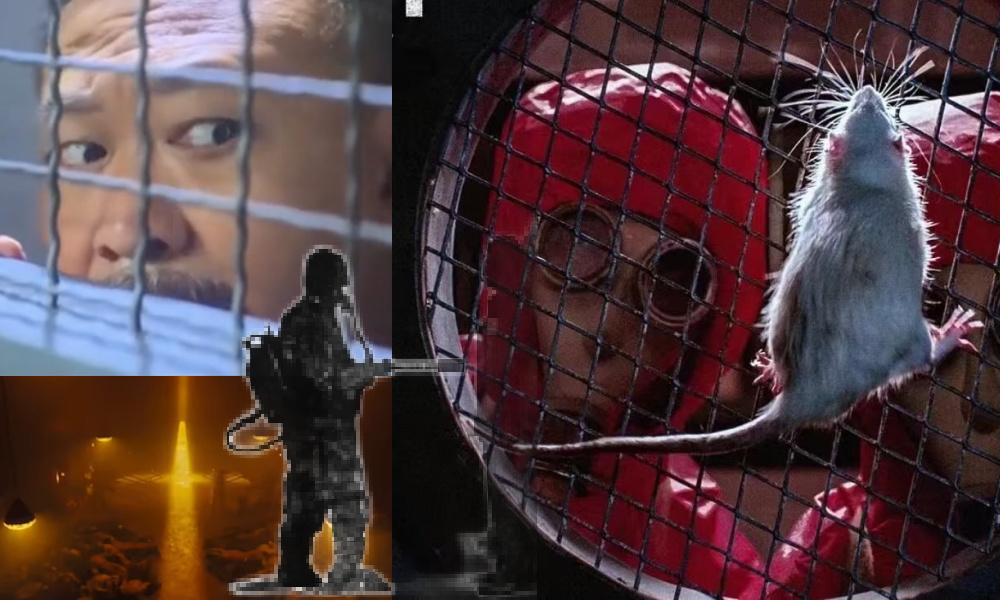
🔥 This is premium content and also appeared in the Weibo Watch newsletter. Subscribe to stay in the loop.
How did Evil Unbound (731), one of the most anticipated Chinese war movies of 2025, go from patriotic hype to online backlash? A deep dive into the official narrative, the audience reception, and everything that’s particular about this movie.
731 and 918, those were the numbers dominating Chinese social media over the past week. Both numbers carry heavy historical weight, but the recent discussions surrounding them reveal two parallel worlds of the official narrative vs the audience experience of a controversial new World War II film.
It was “9.18” on Thursday, when China commemorated the 94th anniversary of the September 18th Incident (九一八事变). On that day in 1931, a small explosion on a Japanese-owned railway near Shenyang (Mukden) was used as a pretext to invade Manchuria.
While many older Chinese were taught in school that the war began in 1937, recent state-led campaigns increasingly emphasize 1931 as the true beginning of China’s “14-year-long war” (1931–1945). Over the past decade, the 918 commemorations have become more prominent online, shaping public memory through nationalistic messaging.
This year, the commemoration had an extra dimension, as it wove the release of Evil Unbound (English title), also known as 731, into the patriotic media narratives around 918.
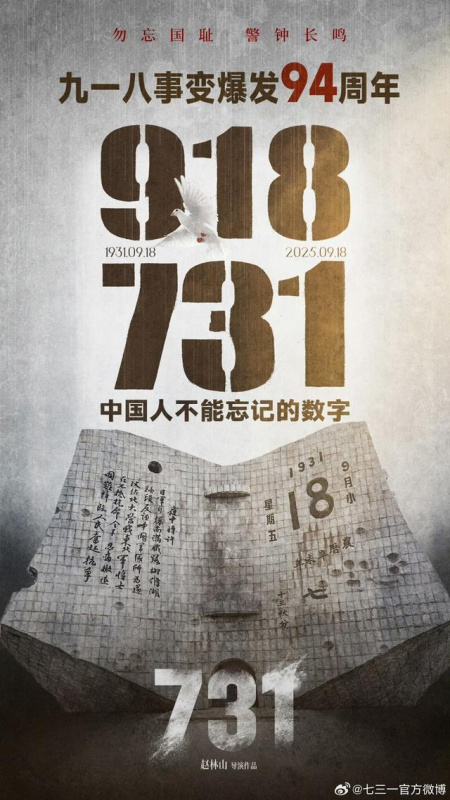
Patriotic film poster putting 918 and 731 together.
The much-anticipated war movie 731 depicts the atrocities of Japan’s Unit 731 (731部队), notorious for conducting horrific biological warfare experiments in Harbin during World War II under Major General Shiro Ishii (石井四郎), a former army surgeon and biologist with a particular interest in historical plagues. Under his command, Japan’s biological warfare and human experimentation in China were carried out on a larger scale than anywhere else between the 1930s and 1940s.
After the war, because the US felt his knowledge on bioweapons was of great value, Ishii was granted political immunity deal and was never brought to trial.
Together with the Nanjing Massacre, Unit 731 has come to symbolize the peak horrors of Japan’s wartime atrocities. Public attention for this history has grown in recent years, especially since the 2015 opening of the Harbin-based Museum of Evidence of War Crimes by Unit 731.
It was around that same time, about a decade ago, when Chinese director Zhao Linshan (赵林山) started working on the movie Evil Unbound (731), produced by Changchun Film Group in collaboration with the Propaganda Departments of Shandong, Jilin, Heilongjiang, and Harbin.
It finally premiered nationwide on Thursday, ‘9.18’ at exactly 9:18 and shattered 10 box office records on its opening day. Screened 258,000 times in a single day, it rapidly surpassed 200 million yuan (US$28 million) in ticket sales. After three days, the box office exceeded 1 billion yuan (US$140 million).
The film focuses on Unit 731 in the final days before Japan’s defeat in 1945, portraying how local salesman Wang Yongzhang (王永章, played by Jiang Wu 姜武) is imprisoned together with other civilians. They are promised freedom in exchange for “health checks and epidemic prevention cooperation,” and are subjected to frostbite experiments, poison gas, and vivisections.
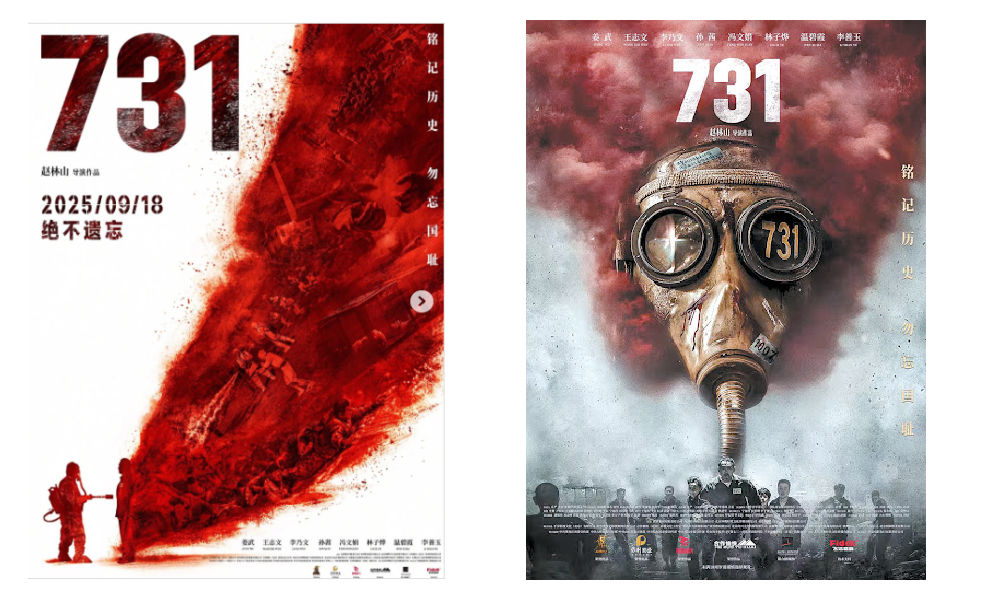
Official film posters for Evil Unbound/731.
“What we made is not a movie — it is historical evidence,” director Zhao said about the film.
A state-orchestrated hashtag ecosystem is currently amplifying the film’s ‘success.’ Similar to previous viral war film hits such as The Battle at Lake Changjin (长津湖) and Nanjing Photo Studio (Dead to Rights 南京照相馆), the media campaigns highlight the film’s commercial performance, its educational and historical value, the ‘authenticity’ of its production process, and its emotional reception and overseas recognition.
Recent trending hashtags, from Kuaishou to Weibo and beyond, include:
- 电影731票房再创新高 – “Film 731 sets another box office record”
- 没有人能在看731时不流泪 – “No one can watch 731 without crying”
- 观众掩面哭泣 / 哭到没法接受采访 – “Audiences cover faces in tears” or “Audiences too moved to be interviewed”
- 观众自发起立唱国歌 – “Audience spontaneously stand up to sing national anthem”
- 海外观众看731不停抹泪 – “Overseas audiences weeping when seeing 731”
- 9岁小孩看完731后泪奔 – “9-year-old child burst into tears after watching 731”
- 日本观众看完电影731后情绪崩溃 – “Japanese audiences having emotional breakdown after watching 731”
- 让731这段历史不再沉默 – “The history of 731 can no longer be silenced”
There are hundreds of other hashtags contributing to this official narrative, that portrays Evil Unbound as an absolute patriotic and commercial triumph.
From Anticipation to Backlash: 731 Between Shawshank and Squid Game
Outside of this official narrative, however, audiences are telling a very different story. Despite months of anticipation, the film has been met with overwhelmingly negative reviews.
On Weibo, the hashtag “731 Film Review” (#731影评#) was pulled offline. On Douban, the movie’s ratings meter was switched off entirely (“暂无评分”). On IMDb, the film is currently rated 3.1.
Usually, criticism of patriotic films is a slippery slope. People have been censored, blocked, or even detained for criticizing war films. But criticism of this film is so widespread, and so ubiquitous across social media platforms, that it is barely containable.
Many viewers called the movie “trash,” while others said they felt “defrauded”.[1] One commenter suggested the director tried to make The Shawshank Redemption but ended up with Squid Game.[2] Others called it “bizarre”[3], or concluded: “The short review section doesn’t even allow enough characters to describe how unbearable this movie is.”[4]
Viewing the film, I must admit I also felt confused – the movie is nothing like you would expect after the state-led promotion of the film.
The opening minutes quickly set a messy historical context, leaping from the 1925 Geneva Protocol to China’s 1943 counteroffensives, to Iwo Jima, and to Japan’s “Operation PX” plan (Operation Cherry Blossoms at Night), a scheme to attack the United States with biological weapons—before landing in Harbin and Unit 731 in the year 1945.
About ten minutes in, the movie seems to switch tracks and take inspiration from Squid Game, the 2021 South Korean survival drama.
Some details appear almost one-to-one from the Netflix show: the cold speaker voice, characters labeled by numbers, stylized lighting (including the Japanese flag’s red dot turned into menacing red spotlight), and eerily sterile sets that create a cold, clinical atmosphere stripped of humanity.
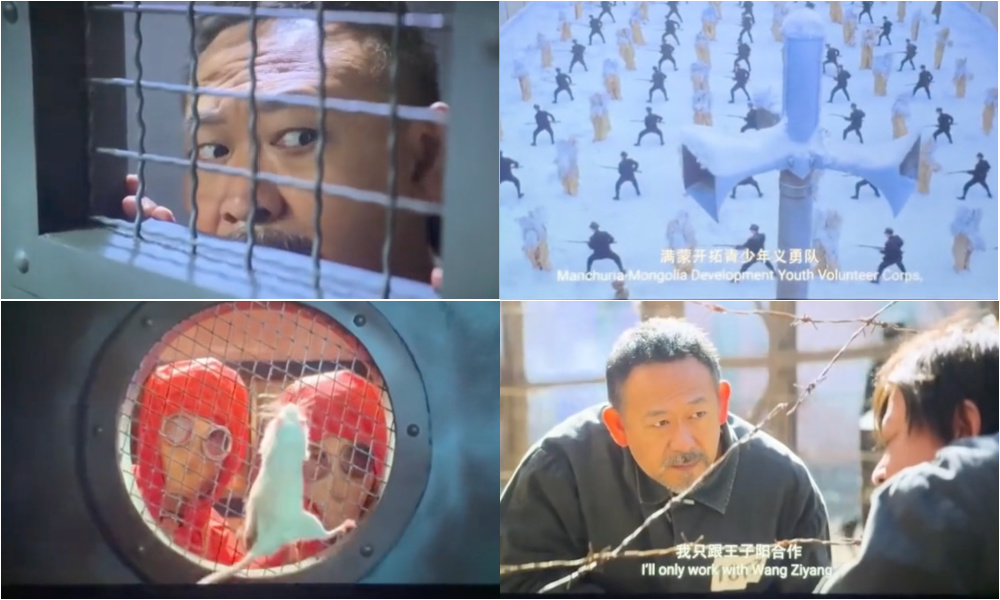
Scenes from 731.
Narrative elements also echo Squid Game’s deadly competitions, including an actual life-or-death rope pulling game. In 731, “winners” are promised freedom (but actually sent for experiments) and “losers” surviving slightly longer, until even these rules seemingly disappear, leaving viewers just as lost as the characters.
Beyond these echoes of Squid Game and The Shawshank Redemption (with their themes of prison break, brotherhood, and hope), where horror meets drama and occasionally even comedy, I also thought I saw traces of The Green Mile (there’s even a befriended mouse), The Shining, One Flew Over the Cuckoo’s Nest, and even Kill Bill.
If this all sounds like a fever dream, that’s about right.
While the film undoubtedly has artistic value in its visual references and symbolism, at times it seems more intent on presenting itself as an arthouse production than on telling a coherent historical war story.
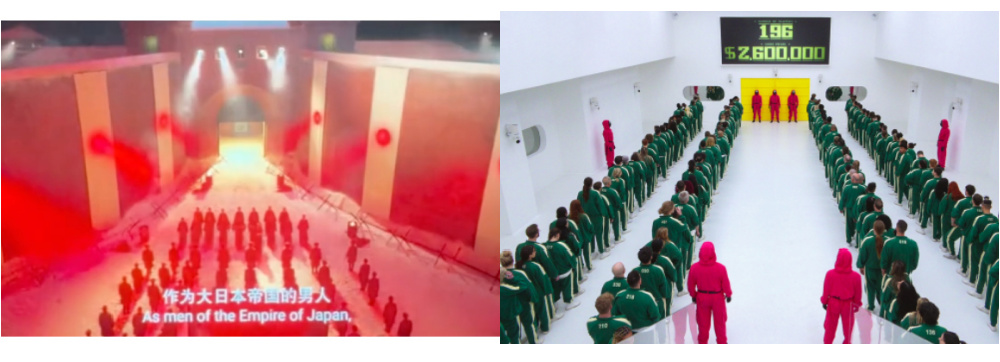
731 scene showing Japanese flags with red lasers/spotlights one the left. Some of the movie’s camera angle points, color use, narrative elements and settings show some similarities with Squid Game (image on right).
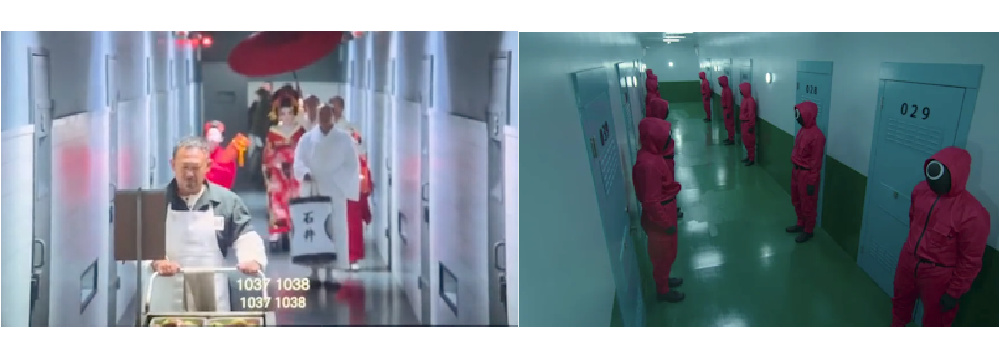
731 (left), Squid Game (right)
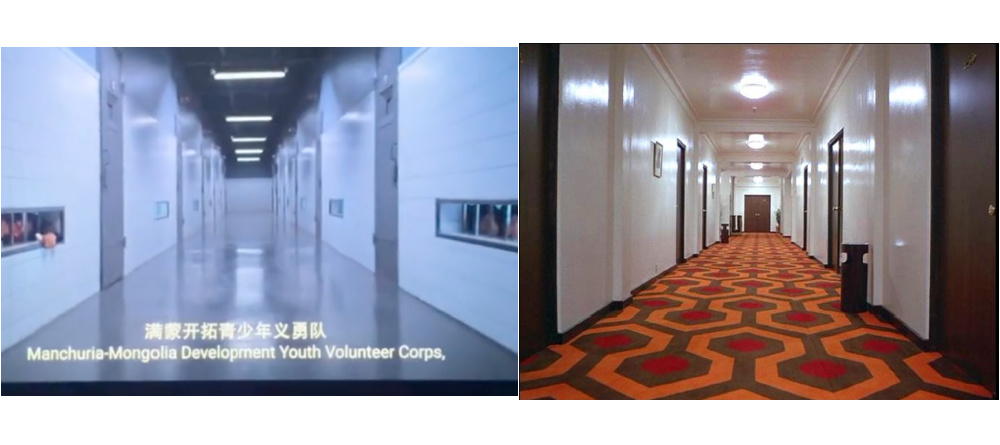
Scene from 731, which I thought sometimes had some echoes from The Shining.

Another reference to Stanley Kubrick? 731 on the left, Clockwork Orange on the right.
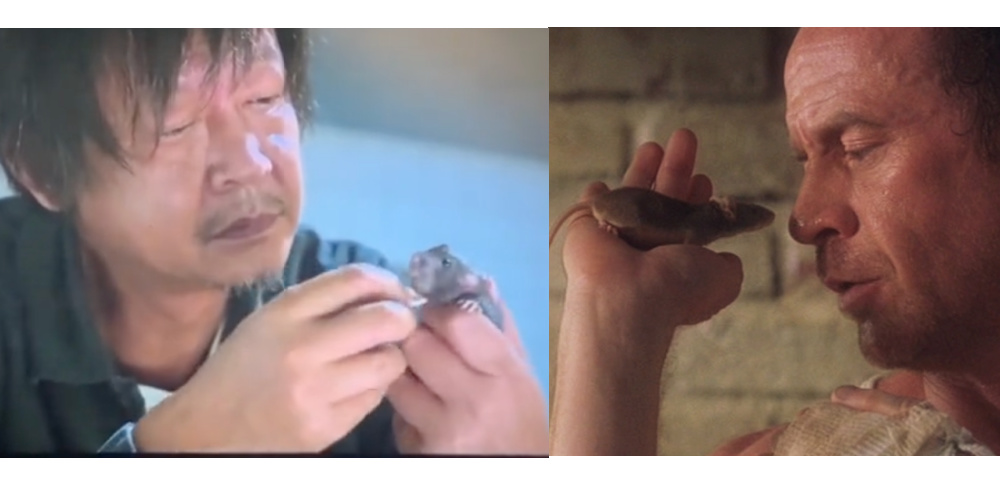
Prison mouse friend. 731 (left) and The Green Mile (right).
And that is also what most of the online critique is about – people feel that while the movie is supposed to be about creating awareness of a particularly horrific part of Chinese war history, the actual factual history seems to have ended up in the background.
One commenter from Harbin wrote:[5]
💬 “For Harbin, 731 is the most painful chapter of history. This movie uses a mass of absurd visuals and music to tell a story that has almost nothing to do with real history. All the information that truly should have been shown is brushed over in passing words, and in the end it just tells audiences ‘never forget history’? This tramples on the history of 731. Stupid and vulgar.”
Others are also upset over historical inaccuracies in the film — from the makeup to the sets, the props, and the biological experiments. Even the toilet paper used by the prisoners isn’t very realistic, with some commenters saying these kinds of details ‘drove them crazy’:
💬 “I’m born after 1990, and even I grew up with worse toilet paper than what the aggressors in those years apparently gave to their prisoners. Theirs was so high-quality you could fold it into bows and baby shoes. Must have been strong, durable, and waterproof.”[6]
One other reviewer on Douban wrote:
💬 “As a prison break film it’s not exciting, as a historical film it’s too careless, and as a drama it’s too fragmented.”[7]
Douban reviewer Qingyun (青云) noted that it jumps from relatively calm scenes to intense emotional outbursts or extreme cruelty without any buildup — instead of moving viewers to tears, it alienates them from the story and its characters.
He adds:
💬 “The film wants to exploit history’s seriousness to entertain the public, but also fears the theme is too depressing and will affect the box office, so it stuffs in commercial gimmicks (jokes, fantasy, spectacle). This opportunism sacrifices the solemnity that is rewired for the historical topic, while also failing to provide as qualified entertainment. The result: it offends history and disappoints audiences.”[8]
Most of these disappointed reviewers argued that the chance to tell the story of Unit 731 was wasted by a director and script that offered little context to the subject, with some even suggesting that another, 37-year-old film (Men Behind the Sun, 黑太阳731, 1988) did a better job of conveying the history of Japan’s biological warfare in China.
A ‘Masterful Cult Film,’ But a ‘Total Failure’ as a War Movie
Despite the wave of strongly negative feedback, there are also those who did find the film moving, giving it five-star reviews — some from those who stress the film’s value as a reminder to “never forget national humiliation,” while others genuinely appreciate its creative vision.
Douban commenter ‘Bat Lord’ (蝙蝠君) called it a “masterful cult film” with the film’s aesthetics being “built on a foundation of Western stereotypical Orientalism of Japan and layered with Christian martyrdom.”[9]
As an example, Bat Lord describes a recurring scene in which prisoners are taken from their cells toward “freedom,” only to be taken to lethal human experiments. They are escorted by Japanese guards in traditional kimonos with samurai swords, led by a geisha carrying a bright red umbrella and wearing impossibly high okobo clogs, followed by Edo-period guards with topknots and white kimono. Bat Lord calls it “Orientalist punk seen through a Western gaze” (“有一种西方视角的东方主义朋克的味道”).
The reviewer also interprets the main characters, the Chinese prisoners, as representations of Christian martyrdom. Cross symbols are indeed everywhere in the film, with prisoner No. 017 constantly drawing crosses on the wall, and an ingenious escape plan hidden in a dictionary as a series of crosses.
At the climax, after battling guards in kimonos with wooden swords, the prisoners flee toward a crematorium resembling a cathedral of light, where crosses formed from pure white beams symbolize freedom. But behind the cross loom the Japanese executioners. After a bloody massacre, the survivors are captured and executed — tied to crosses arranged around a pit, with fleas dropped on them from above as Japanese officers watch from a grandstand.
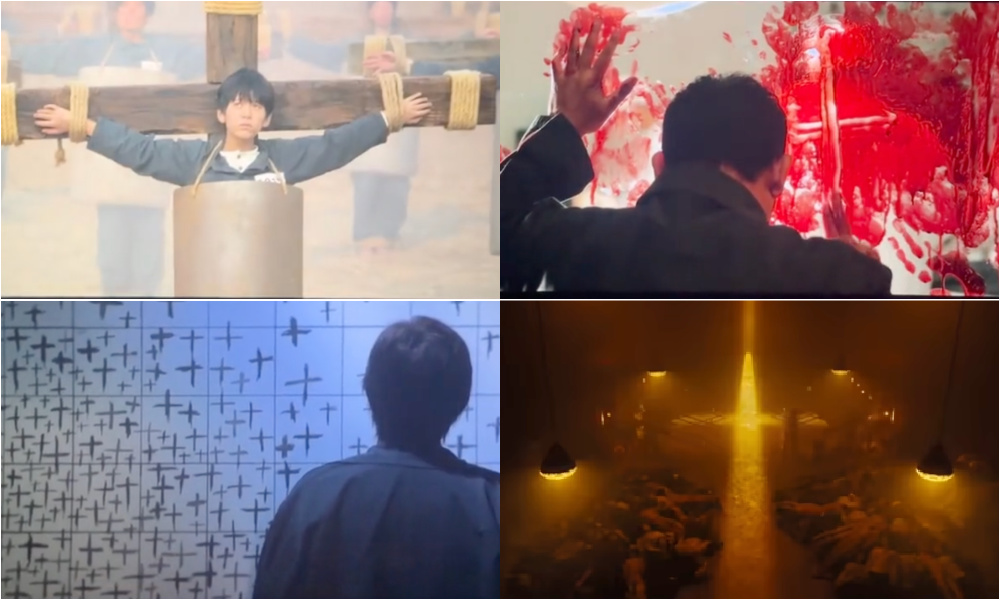
Cross symbols appear throughout the film.
💬 “It’s clearly a direct homage to Christian martyrs who were sacrificed in the Colosseum during the ancient Roman Empire. In the end, all the protagonists die martyrs’ deaths,” Bat Lord writes.[10]
He concludes that the film is “4/5 as an art house film, but zero points as a war movie”:
💬 “As a mainstream patriotic commercial blockbuster, it is a complete and utter failure (..) But as a niche cult prank film, it actually has some positive points (…) – built on exaggerated Orientalist visions of Japan, it feels strangely authentic. This kind of deconstruction of Japanese culture isn’t something the Japanese themselves could do — only the West or China, as seen in works like The Last Samurai, Ghost of Tsushima, and Shogun.” [11]
He adds:
💬 “The biggest problem is the subject matter. Using 731 — such a solemn, tragic history — only to hollow out its pain, exploit national emotions, and repackage it as a cult prank film disguised as a patriotic blockbuster, inevitably backfires. If it had been framed as a semi-fictional low-budget black comedy, the backlash wouldn’t be so severe.”[12]
“No Japanese in Heaven”: Over-‘Othering’ the Enemy
How could 731 have failed so miserably to live up to public expectations?
In recent years, Chinese museums, books, and popular culture have made many attempts to revitalize the history of war and make it more relevant to younger generations. In many cases, this has been successful, from popular war dramas to blockbuster films.
But Unit 731 is perhaps an especially difficult subject to adapt into a commercially successful film for a broad audience, especially since it chose to leave out the kind of contextualization that Oppenheimer provided in exploring the history, process, and character development that led to the atomic bomb.
Like the gas chambers of Auschwitz or Mengele’s brutal experiments, its history is so gruesome that there is little to focus on beyond the suffering of the victims and the cruelty of the perpetrators. (The film had already been postponed once, as it allegedly failed to pass official screenings due to its graphic scenes.)
War films in China are expected to reflect — or help shape — national identity. In 731, this means boosting national unity by focusing on Japan as the ultimate “Other,” the ‘constructed outsider’ against which the own national identity is defined.
The entire nation is cast as an enemy, depicted through exaggerated cultural symbols — geishas, kimonos, samurai, and cherry blossoms — regardless of whether they belonged in the actual prison setting. Japan’s national colors and imagery are fused with scenes of bloody and barbaric slaughter, turning Japanese cultural identity itself into a target.
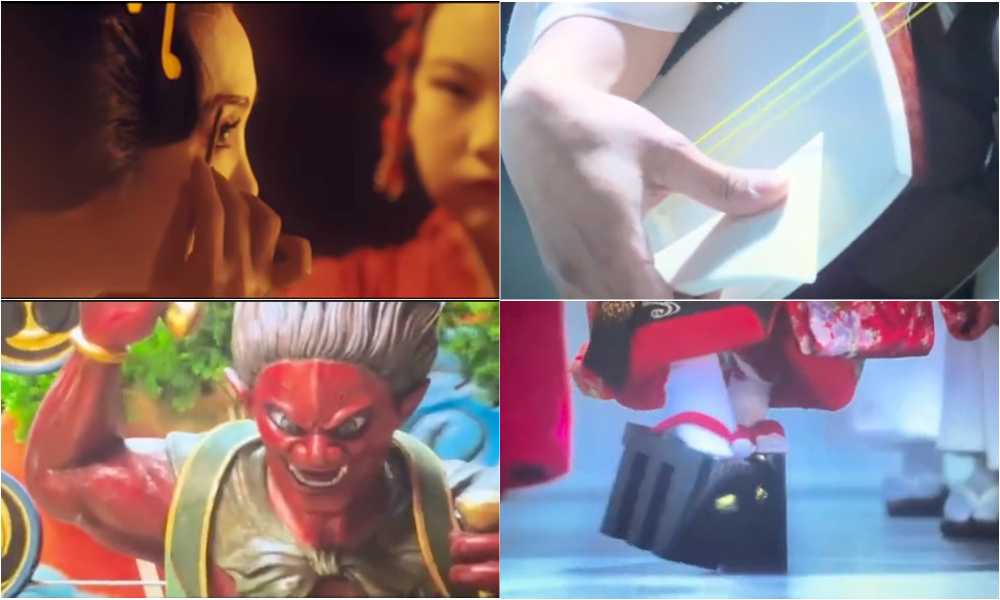
References to Japanese cultural symbols in the film.
In doing so, the film not only holds Japan as a whole responsible for its wartime aggression, but also strengthens Chinese identity by defining it in opposition to Japan, visually contrasting “good” versus “evil” through opposing characters, colors, and symbols.
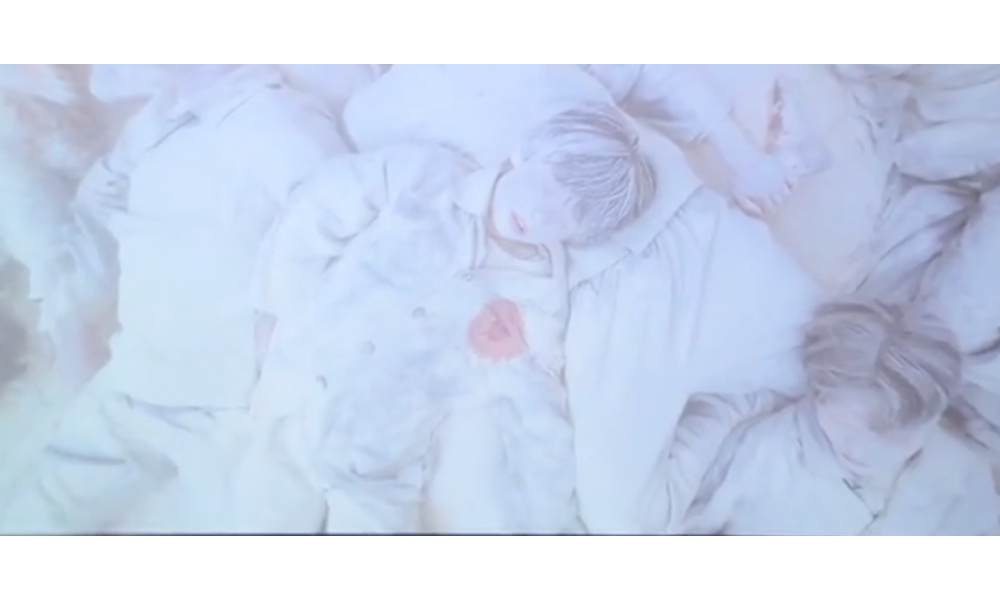
Clear visual symbols: dead Chinese bodies covered in white dust. With the red circle of blood, the scene resembles a Japanese flag.
This contrast is also made explicit in dialogue: at the beginning of the film, for instance, a young boy enters the stark white prison halls and asks, “Master, are we in heaven?” to which the older Chinese man replies, “Nonsense, how could there be Japanese in heaven?”
In promoting the film, director Zhao Linshan (赵林山) reinforced the image of Japan as the eternal “Other” by explaining that he had insisted none of the Japanese roles could have possibly played by Chinese actors, suggesting they would not be able to convey their evilness. Despite the difficulty of bringing over more than 80 Japanese actors during China’s ‘zero Covid’ era, when 731 was largely filmed, Zhao maintained that “only the Japanese can play this dual nature.”
While Chinese social media is often filled with anti-Japanese sentiment, many viewers criticized the depiction of “Japan” and the Unit 731 staff — not because of the anti-Japanese angle, but because they felt it trivialized history. They argued that Unit 731 was already so horrific that it needed no added gimmicks, tropes, or exaggerated villains to make it look bad.
As Douban reviewer Qingyun wrote:
💬 “Portraying devils as clowns diminishes their true guilt. The real criminals were rational, organized, and intelligent, embodying the will of Japanese militarism as a systematic project. Making them idiots (..) greatly underestimates the danger and organization of militarism, and is a severe simplification of history.”[13]
This critique goes further, suggesting the film both weakens its warning value (“the true terror is that advanced civilization and barbarism can coexist”) and cheapens the victims’ suffering (“if the enemy is so stupid, the tragedy seems less grave”).
On Weibo, one commenter criticized this one-sided approach:
💬 “I saw an auntie in Hangzhou who, after watching the movie 731, said she hated the Japanese devils so much — that she would hate them for her entire life. But this elderly woman, brainwashed by hatred education for a lifetime, doesn’t stop to think that (..) so many other brutal slaughters happened throughout Chinese history. If you only speak of hate, can your hate keep up with all of them? Shouldn’t we instead explore and reflect more deeply on the underlying causes of these events? Better to talk less of hate and more of love — because only the most genuine love from the depths of the human heart can ultimately prevent such tragedies from happening again.”[14]
Some viewers who appreciated the film, however, disagreed. One Weibo user wrote: “I watched the film with my husband and on our way home we scolded the Japanese, wishing we could throw two more atomic bombs on them. It was a good film.”
Between the history and the hate, the official narrative, the polarized audience reactions, and disagreements over the film’s message, 731 has brought more controversy than clarity.
But beyond the debate and confusion, one message remains clear. As one viewer wrote:
“The film wasn’t what I expected, but I’m not sure what I even expected? A good story? More like a documentary? There’s one thing I can say for sure: this movie is just a shell — the history itself is the soul.”[15]
By Manya Koetse
Spotted a mistake or want to add something? Please let us know in comments below or email us. First-time commenters, please be patient – we will have to manually approve your comment before it appears.
References
- “看完有种被诈骗的感觉” (source: Douban).
- “一句话评价《731》,导演按照《肖申克的救赎》拍出了《鱿鱼游戏》” (source: Xiaohongshu).
- “令人非常迷惑” (source: Douban).
- “短评骂的字数不够了实在是忍不了了” (source: Douban).
- “作为一个哈尔滨人,去过至少三次纪念馆,731对于哈尔滨就是最沉痛的一段历史,这个电影用大量极其荒诞的镜头和音乐,讲述一个基本跟真实历史毫无关系的故事,所有真正需要拍出来的信息全部是文字一笔带过,最后却告诉观众勿忘历史?这是对731这段历史的践踏。弱智且下流” (Source: comment section Sina).
- “作为一个90后,我出生的那个年代卫生纸质量都达不到侵略者给实验体使用的,纸的质量太好了,又是编蝴蝶结,又是编鞋子的,我猜应该是坚韧又耐用,透水都不断的那种吧” (Source: Douban long reviews).
- “或许是删减太多或许是各种局限,当做越狱不精彩,当做历史片太随意,当做剧情片太碎片”(Source: Douban).
- “影片既想利用沉重历史的严肃性作为宣传噱头,又担心题材过于压抑影响票房,于是强行注入商业娱乐元素(搞笑、幻想、刺激场面)。这种“既要…又要…”的投机心态导致影片既失去了历史题材必需的敬畏感,又未能提供合格的娱乐体验。最终,它既冒犯了历史,也辜负了观众”(Source Douban, review by Qingyun (青云).
- “西方刻板印象东方主义日本与基督殉难的碰撞,cult片的杰出之作”(Source: Douban, review by ‘Bat Lord’ (蝙蝠君).
- “很明显也在致敬古罗马帝国时期殉道在斗兽场的圣徒们。最终主角团全员殉道,无一幸免。”
- “这个片作为主流主旋律商业大片是完全的,彻头彻尾的失败,彷佛那纯纯的依托!甚至从预告片开始这电影就没有任何一丝一毫的符合历史,我从一开始就完全没有抱任何期望的去看,结果发现这片作为小众邪典整蛊片却颇有可取之处(。。)当你不认为这片是正常电影之后,这片表达出的那股子真的是超正宗的外国视角下的刻板印象东方主义日本美学、东方朋克味,这种对日本文化的魔怔向的解构其实我个人还真感觉挺不错的。这种解构日本人是搞不出来的,目前只有欧美和中国能搞出来,代表作就是《最后的武士》、《对马岛》、《幕府将军》之类的作品,里面的日本文化,日本武士道精神一个赛一个魔怔,欧美是往骑士幻想的那个路子去走的,我们是往黑暗邪典的路子去走的“
- “所以这片的最大问题还是选择了731这个严肃题材,完全在消解历史的悲痛,消费民族的情感,拍了个小众邪典整蛊片后,还按照主流商业片来包装和宣发,如果他拍成半架空的超小成本黑色喜剧我觉得反噬恐怕不会有这么大”(Source: Douban).
- “它美化了真正的邪恶:将恶魔塑造成小丑,实际上减轻了他们的罪责。真实的731部队不是一群疯癫的傻瓜,而是清醒的、有组织的、高智商的罪犯。他们的行为是日本军国主义国家意志的体现,是一个系统性的工程。把他们拍得弱智,仿佛这场悲剧只是一群笨蛋造成的意外,这极大地低估了军国主义的危害性和组织性,是对历史的严重简化”(source: Douban).
- “看到一位杭州阿姨看完电影731后讲太恨日本鬼子了,要一辈子一辈子的恨。这个被仇恨教育洗脑一辈子的老太太,您也不思考一下,嘉定三屠,江东六十四屯,南京大屠杀等等一系列的野蛮屠杀事件在中国历史上发生的太多了,光讲恨您恨的过来吗?不应该是更多的探究和反省发生这些事的深层原因嘛!还是少谈恨多讲爱吧,只有发自心底人类最真实的爱才能最后解决这些惨案在人类世界的发生吧”(Source: Weibo).
- Weibo user “红屋顶上的猫”: “我不知道该怎么评。首先在这个忙乱的日子里安排自己去看这个电影,我也说不清楚我是想铭记那段历史,还是想比较小时候看过的《荒原城堡731》,还有那部《黑太阳》。其次我也不知道电影从越狱视角切入,写实和魔幻风格交替,是好还是不好?但它和我想象的不一样,可我也不知道自己想看到的到底是什么样?甚至我也说不清我对这场电影的期待是什么?讲好故事?还是拍成纪录片?我只能确定,电影只是个壳子,那段历史才是灵魂。”
©2025 Whatsonweibo. All rights reserved. Do not reproduce our content without permission – you can contact us at info@whatsonweibo.com.
Subscribe
What’s on Weibo is a reader-supported publication, run by Manya Koetse (@manyapan), offering independent analysis of social trends in China for over a decade. To receive new posts and support our work, consider becoming a paid subscriber.

Get in touch
Would you like to become a contributor, or do you have any tips or suggestions? Get in touch here!

China Faces Unprecedented Donkey Shortage Crisis

Nanchang Crowd Confuses Fan for Knife — Man Kicked Down and Taken Away

The Wong Kar-wai Scandal Explained: The Dark Side of ‘Blossoms Shanghai’

China’s National Day Holiday Hit: Jingdezhen’s “Chicken Chop Bro”

Evil Unbound (731): How a Chinese Anti-Japanese War Film Backfired

Hidden Cameras and Taboo Topics: The Many Layers of the “Nanjing Sister Hong” Scandal

“Jiangyou Bullying Incident”: From Online Outrage to Offline Protest

The Rising Online Movement for Smoke-Free Public Spaces in China

China Trend Watch: Pagoda Fruit Backlash, Tiananmen Parade Drill & Alipay Outage (Aug 11–12)

From Schadenfreude to Sympathy: Chinese Online Reactions to Charlie Kirk Shooting
Popular Reads
-

 China Memes & Viral3 months ago
China Memes & Viral3 months agoHidden Cameras and Taboo Topics: The Many Layers of the “Nanjing Sister Hong” Scandal
-

 China Books & Literature11 months ago
China Books & Literature11 months agoThe Price of Writing Smut: Inside China’s Crackdown on Erotic Fiction
-

 China Insight5 months ago
China Insight5 months agoUnderstanding the Dr. Xiao Medical Scandal
-

 China Memes & Viral9 months ago
China Memes & Viral9 months agoOur Picks: Top 10 Chinese Buzzwords and Phrases of 2024 Explained


